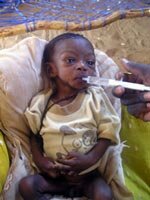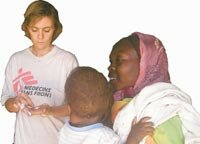06 September 2008
Nurse tells of Darfur horror
13 October 2006
By Dianna Vezich: Te Waha Nui Online
 |
Photo: Lisa Blaker
|
A New Zealand nurse has spoken out against “atrocities” in the western Sudan region of Darfur amid reports of mounting attacks on aid workers.
Lisa Blaker, who recently returned to Auckland after working in the region for aid agency Medecins Sans Frontières (MSF), says that if no one acts, the Darfur conflict will continue until the entire region is “cleared” of ethnic minorities.
The softly spoken 35-year-old wants the world to know about the horrors of Darfur — and she plans to go back to help.
Nigerian President Olusegun Obasanjo warned this week over possible genocide in the region while $2.5 million in humanitarian aid has been hampered.
MSF says four of its Darfur workers have been attacked, and one woman staff member had been sexually harrassed.
Hollywood actor George Clooney received some negative comments with his recent campaign visit to Darfur. Some critics said his visit was a mere publicity stunt.
“At least George Clooney’s visit cast some much-needed attention upon Darfur,” Blaker says.
“He smuggled cameras into the area and was able to show the images of suffering. His message was for the world to stop and actually do something about what’s going on in Darfur. If people respond to George Clooney then that’s fantastic.”
’Horror stories’
Working five days a week at Middlemore Hospital suddenly lost its appeal when Lisa Blaker heard the “horror stories” of Darfur – stories she says are being ignored by the international community.
 |
Photo: Lisa Blaker
|
And after spending nine months amid the fighting, Blaker certainly knows the issues are too large to neglect.
One of only three New Zealanders working in the region, Blaker says whole villages are being destroyed by the Government-backed militia, leaving the people of Darfur with no security.
A number of sources, including the United Nations, cite a figure of about 400,000 deaths in the conflict since 2003.
Blaker says she has no idea just how many have become victims of the “social injustices” occurring in this part of Africa.
“No one knows the exact figure. I asked people who would come to our clinics, and they didn’t know either. Most of their friends and family had become internally displaced, escaping into the bush, and in refugee camps. They had no idea where they were,” she says.
Blaker’s role in Darfur was working in the hospital in Muhajariya, the village where she spent most of her time. She conducted clinics under the trees.
Many of her patients would walk incredibly long distances for medical treatment, the majority being mothers with children.
Six hours to a clinic
“Imagine the frustration when I know someone has walked six hours to come to a clinic, and there’s been an attack and we can’t get there; nor can we let the people know we’re not coming,” she says.
Originally from Howick, Blaker still has an urge to be back providing humanitarian help in the midst of the conflict.
“I received an email from a colleague of mine the other day. It was two lines. All it said was: ‘We’ve been attacked; we’re going to the bunker.’ It made me think I should be there.”
Amnesty International activism support manager Margaret Taylor says the Sudanese Government-sponsored militia — the Janjaweed — are responsible for most of the attacks.
“They’re the ones gang-raping women after they have broken their legs so they can’t run away. They’re threatening to throw babies in pots and cook them. They’re the ones who have hurt thousands of children in front of their parent’s very eyes.”
Blaker also says much of the fighting is initiated by the Janjaweed, a mainly Muslim militia. The target is mainly the Fur, Zaghawa and Masalit ethnic groups.
“The attacks from the Janjaweed are not so much to kill everyone, but to destroy the village so the people cannot return,” says Blaker.
Taylor says the Government is turning a blind eye to the problems in Darfur.
“They don’t give a damn about the atrocities carried out on its own people. They sponsor the Janjaweed to carry out attacks and kill and torture the people of Darfur,” she says.
Villages destroyed
Whole villages have been destroyed causing people to flee into the desert and bush. This creates an influx of internally displaced people (IDPs).
The United Nations High Commission for Refugees says an estimated two million people have fled Darfur taking refuge in neighbouring Chad or in camps such as “North Camp”.
Although she says the Janjaweed are responsible for much of the fighting, Blaker describes an incident of tribal fighting where 80 of its members were killed.
“I remember these six men lying dead in the hot sun. No one would move them, and I kept seeing them day after day. We couldn’t move them because it would look like we were taking sides.
“One man stood out because someone had stolen his boots. I remember his white sports socks that he was wearing. I’ll always remember them,” she says.
While resources such as medicines are limited, Blaker says finding the time to treat all the patients is difficult.
“I’d wake up and there would be 400 people waiting outside the clinic.
“If I went flat out and didn’t go to the toilet, didn’t have anything to eat, I could see 120 patients maximum. How do I tell people to go away after they’ve been waiting all day, some two days?”
’Guilty’ feelings
Many of the patients Blaker saw remain in her everyday thoughts. Their plight stays with her and she feels “guilty”, for not being with them now.
Baby Mohammed was one of these patients. His mother was pregnant with her tenth child when she brought him in to see Blaker.
“He was extremely sick and we needed to hydrate him,” she says.
“His mother had to return to her village to see to her eight other children. She never came back for Mohammed. I had to move on, and I believe Mohammed died.”
Politics play a huge role in this conflict. Taylor says Russia and China recently voted against a United Nations resolution to send UN peacekeepers to Darfur.
“Russia has strong trading connections with Sudan by selling them arms, and China buys much of Sudan’s oil,” Taylor says.
Blaker believes the first solution to ending the conflict is to stop the fighting.
She says because the Sudanese Government won’t take responsibility, international pressure is needed to let in UN troops.
“We need to put pressure on Sudan, Russia and China. Amnesty International is putting pressure and writing to Russia and China’s embassies around the world.
“New Zealanders can sign Amnesty’s petition. People might not think it’s much, but at the moment it’s a start.”
Links:
- PDF page file
- Darfur
- Medecins Sans Frontières (MSF)
- Nigerian President Olusegun Obasanjo
- George Clooney
- Clooney’s Darfur dilemmas




